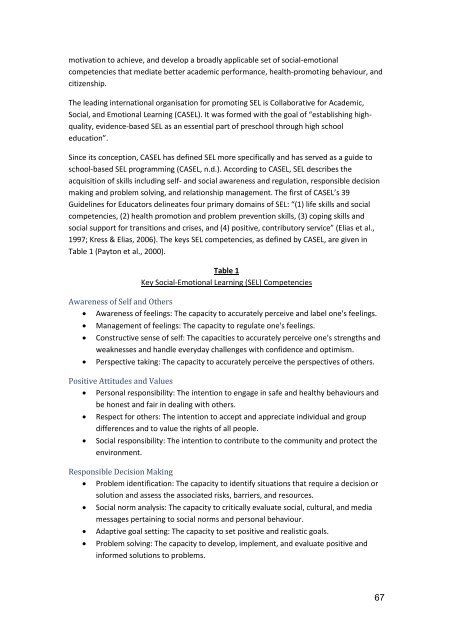Teaching and Assessing Soft Skills - MASS - Measuring and ...
Teaching and Assessing Soft Skills - MASS - Measuring and ...
Teaching and Assessing Soft Skills - MASS - Measuring and ...
You also want an ePaper? Increase the reach of your titles
YUMPU automatically turns print PDFs into web optimized ePapers that Google loves.
motivation to achieve, <strong>and</strong> develop a broadly applicable set of social-emotional<br />
competencies that mediate better academic performance, health-promoting behaviour, <strong>and</strong><br />
citizenship.<br />
The leading international organisation for promoting SEL is Collaborative for Academic,<br />
Social, <strong>and</strong> Emotional Learning (CASEL). It was formed with the goal of “establishing highquality,<br />
evidence-based SEL as an essential part of preschool through high school<br />
education”.<br />
Since its conception, CASEL has defined SEL more specifically <strong>and</strong> has served as a guide to<br />
school-based SEL programming (CASEL, n.d.). According to CASEL, SEL describes the<br />
acquisition of skills including self- <strong>and</strong> social awareness <strong>and</strong> regulation, responsible decision<br />
making <strong>and</strong> problem solving, <strong>and</strong> relationship management. The first of CASEL’s 39<br />
Guidelines for Educators delineates four primary domains of SEL: “(1) life skills <strong>and</strong> social<br />
competencies, (2) health promotion <strong>and</strong> problem prevention skills, (3) coping skills <strong>and</strong><br />
social support for transitions <strong>and</strong> crises, <strong>and</strong> (4) positive, contributory service” (Elias et al.,<br />
1997; Kress & Elias, 2006). The keys SEL competencies, as defined by CASEL, are given in<br />
Table 1 (Payton et al., 2000).<br />
Table 1<br />
Key Social-Emotional Learning (SEL) Competencies<br />
Awareness of Self <strong>and</strong> Others<br />
Awareness of feelings: The capacity to accurately perceive <strong>and</strong> label one's feelings.<br />
Management of feelings: The capacity to regulate one's feelings.<br />
Constructive sense of self: The capacities to accurately perceive one's strengths <strong>and</strong><br />
weaknesses <strong>and</strong> h<strong>and</strong>le everyday challenges with confidence <strong>and</strong> optimism.<br />
Perspective taking: The capacity to accurately perceive the perspectives of others.<br />
Positive Attitudes <strong>and</strong> Values<br />
Personal responsibility: The intention to engage in safe <strong>and</strong> healthy behaviours <strong>and</strong><br />
be honest <strong>and</strong> fair in dealing with others.<br />
Respect for others: The intention to accept <strong>and</strong> appreciate individual <strong>and</strong> group<br />
differences <strong>and</strong> to value the rights of all people.<br />
Social responsibility: The intention to contribute to the community <strong>and</strong> protect the<br />
environment.<br />
Responsible Decision Making<br />
Problem identification: The capacity to identify situations that require a decision or<br />
solution <strong>and</strong> assess the associated risks, barriers, <strong>and</strong> resources.<br />
Social norm analysis: The capacity to critically evaluate social, cultural, <strong>and</strong> media<br />
messages pertaining to social norms <strong>and</strong> personal behaviour.<br />
Adaptive goal setting: The capacity to set positive <strong>and</strong> realistic goals.<br />
Problem solving: The capacity to develop, implement, <strong>and</strong> evaluate positive <strong>and</strong><br />
informed solutions to problems.<br />
67





